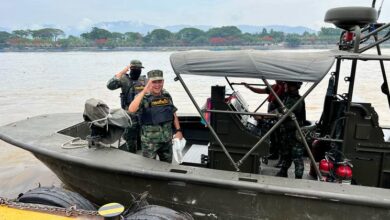Aid is starting to arrive in Gaza through the US-built dock, but officials say it is not enough

Humanitarian aid trucks began moving ashore into Gaza early Friday morning through a temporary dock built by the US military, the first aid will be sent to this land by sea after two months. However, new shipments of food and other supplies fall short of what humanitarian groups say are needed to meet staggering levels of hunger in Gaza.
A day earlier, the US military said it had anchored floating docks and causeways to the beach in Gaza, an important step in completing the maritime corridor that the Pentagon announced in March. U.S. officials and international aid groups say sea shipments can only supplement land deliveries, not replace them.
The US military said no US soldiers entered Gaza on Friday, stressing that it was only providing logistical support for the transport of goods donated by several countries and organizations.
The war-torn territory with 2.2 million civilians is more dependent than ever on humanitarian aid. The devastation from seven months of Israeli bombardment, strict Israeli checks and restrictions on crossing points have severely limited what can enter. And over the past week and a half, since Israel began its military offensive around the city of Rafah, the flow of supplies through the main land crossings in southern Gaza has dwindled to a trickle.
Aid agencies continue to report worsening conditions in Gaza. “We have never seen anything like this anywhere on the planet,” Janti Soeripto, president and CEO of Save the Children US, told the New York Times on Friday.
Israel has come under pressure from the Biden administration and other allies to do more to ease aid access, with Secretary of State Antony J. Blinken warning this week that Recent improvements in relief supplies are being cut back by fighting in and around Rafah.
According to the main United Nations agency assisting the Palestinians, more than 630,000 Gazans have fled Rafah since Israel began its military offensive there on May 6. Many have been displaced to the city Deir al Balah center, where the United Nations agency, known as UNRWA, said on social networks now “overcrowded with harsh conditions.”
This week, the top diplomats of 13 countries – including every member of the Group of Seven industrialized democracies except the United States – said in a joint letter, a copy of which was seen by The New York Times. letter, that Israel must take “urgent action” to resolve the humanitarian crisis in Gaza. The letter, sent to the Israeli Foreign Minister, called on the Israeli government to expand the amount of aid into the territory, take “concrete actions” to protect civilians and work towards a “sustainable ceasefire”.
On Friday, at a hearing at the International Court of Justice in The Hague, lawyers representing Israel defended the military operation in Rafah as “limited and localized,” arguing that the judges should not seek to limit Israel’s actions in Gaza.
The hearings at the court, the United Nations’ highest judicial body, are part of a case filed by South Africa in December accusing Israel of committing genocide against Palestinians in Gaza. At the end of January, the court ordered Israel to do more to prevent acts of genocide, but it is not expected to hear the main case on whether genocide was committed until next year.
Last week, South Africa asked judges to issue an emergency order to prevent widespread civilian harm in Rafah. Lawyer for South Africa argued in court on Thursday that Israel’s Rafah operation was “the final step in the destruction of Gaza and its Palestinian people.”
On Friday, Gilad Noam, Israel’s deputy attorney general for international law, echoed Israel’s harsh denial that it is committing genocide in Gaza. He said Israeli authorities were working to facilitate the flow of humanitarian aid and protect civilians amid fierce fighting across the region, including in Rafah.
“Israel is taking steps to try to deal with the enormous complexity that such a situation brings,” Mr. Noam told the jury. “That is why there was not a large-scale attack on Rafah but instead specific, limited and localized operations, prefaced by evacuation efforts and support for operations humanitarian.”
The Israeli military said it is working with the US military to support the temporary dock project as a “top priority”.
According to the U.S. Agency for International Development, the supplies that began arriving Friday are just a fraction of what is needed in Gaza: food bars for 11,000 people, medical food for 7,200 malnourished children and hygiene kits for 30,000 people. The British government said it had sent 8,400 temporary shelters made of plastic sheeting.
British Prime Minister Rishi Sunak said: “More aid will come in the coming weeks, but we know the maritime route is not the only answer.” declare.
It is unclear where and when the aid will be delivered in this area. The United Nations World Food Program said in a statement that it will handle the logistics in Gaza for aid passing through the dock, including coordinating trucks, overseeing loading, sending goods to the warehouse and delivered to “humanitarian partners”.
Pentagon officials said they initially aim to deliver about 90 trucks of aid by sea each day, then increase to about 150 trucks when operations reach capacity. About 500 trucks carrying commercial goods and aid arrived in Gaza every day before the war began last October.
According to the Pentagon, Defense Secretary Lloyd J. Austin III talked about the maritime corridor in a call with his Israeli counterpart, Yoav Gallant, on Thursday. According to the ministry, Mr. Austin emphasized the need to “increase” humanitarian assistance to Gaza through land border crossings beyond the docks.
Vice Admiral Brad Cooper, Deputy Commander of Central Command, said the dock would only supplement the flow of aid through land routes, which he emphasized were “the most effective and efficient route to move amount of support needed.
One of Gaza’s two main aid crossings, in Rafah, on the border with Egypt, has been closed since Israel began its military campaign against Hamas militants there. Israel has closed its second major border crossing at Kerem Shalom after a while Hamas rocket attack nearby killed four Israeli soldiers last week. Israel said that crossing had been reopened.
An aid group, World Central Kitchen, built one temporary wharf in mid-March to deliver aid by sea to Gaza for the first time in nearly two decades. But those efforts came to an abrupt halt in early April after seven of the group’s workers was killed in an Israeli attack.




